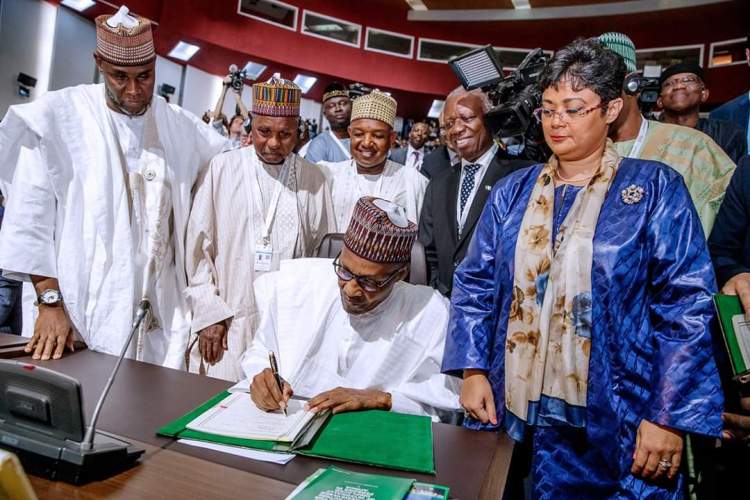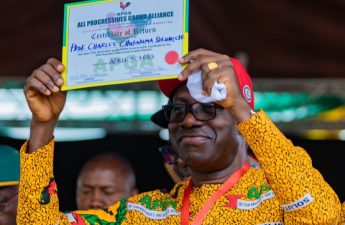President Muhammadu Buhari has just signed the African Continental Free Trade Area Agreement(AFCFTA) in the Niger Republic where he is Currently attending The African Union Summit.
Many Nigerians were however not aware of the real meaning, merits and demerits of this Agreement. So, if you care to know important implication of that agreement, keep on reading.
MEANING
The African Continental Free Trade Area(AfCFTA) is a free trade area, outlined in the African Continental Free Trade Agreement among 52 of the 55 African Union nations. The free trade Area is the largest in the world in terms of participating countries since the formation of the World Trade Organisation.
WHAT IS IN THE AGREEMEN?
The agreement was brokered by the African Union (AU) and was signed on by 44 of its 55 member states in Kigali, Rwanda on March 21, 2018. The agreement initially requires members to remove tariffs from 90% of goods, allowing free access to commodities, goods, and services across the continent.
The United Nations Economic Commission of Africa estimates that the agreement will boost intra-African trade by 52 percent by 2022. The proposal was set to come into force 30 days after ratification by 22 of the signatory states. On April 2, 2019, The Gambia became the 22nd state to ratify the agreement, and on April 29 the Saharawi Republic made the 22nd deposit of instruments of ratification.
WHEN WILL THE AFCFTA START WORKING?
The agreement went into force on May 30 and will enter its operational phase following the summit on July 7, 2019.
HOW IS AFCFTA GOING TO WORK?
AfCFTA secretariat
The secretariat will be responsible for coordinating the implementation of the agreement and shall be an autonomous body within the AU system. Though it will have independent legal personality, it shall work closely with the AU Commission and receive its budget from the AU. The Council of Ministers responsible for trade will decide on the location of the headquarter, structure, role and responsibilities.
Assembly of the African Union Heads of State and Government
The Assembly is the highest decision-making body. It is likely to meet during the AU Summits.
Council of Ministers responsible for trade
The Council provides strategic trade policy oversight and ensures effective implementation and enforcement of the AfCFTA Agreement.
Committee of Senior Trade Officials
The Committee of Senior Trade Officials implements the Council’s decisions. The Committee is responsible for the development of programs and action plans for the implementation of the AfCFTA Agreement.
Dispute Settlement Body
Its rules and procedures will be laid down in the Protocol on Dispute Settlement, which is to be negotiated.
Committees
Several Committees will be established through protocols to assist with the implementation of specific matters. It is already agreed to establish committees for trade in goods, trade in services, on rules of origin, trade remedies, non-tariff barriers, technical barriers to trade and on sanitary and phytosanitary measures.
Eritrea is the only country that is yet to sign the Agreement
President Muhammadu Buhari was particularly reluctant to join if it hurt Nigerian entrepreneurship and industry. On July 7, 2019 Nigeria and Benin finally committed to signing the Africa free trade at the 12th extraordinary session of the assembly of the union on ACFTA; leaving Eritrea as the only nation out of the 55 African Union Member States to sign up to the deal and to ratify same.



